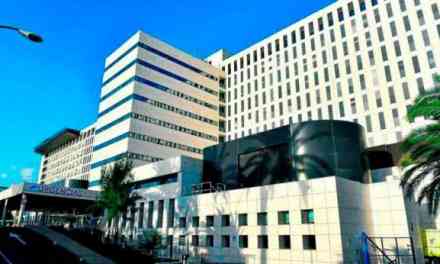Spain’s Government Delegate in the Canary Islands, Anselmo Pestana, on Friday strongly refuted Cabildo de Gran Canaria President Antonio Morales’s suggestion that the Spanish State might be trying to turn Gran Canaria into a “prison so that migrants do not reach the continent”.
Pestana repeated his commitment to prioritise repatriations, returns and expulsion for all irregular arrivals who cause problems, or are involved in any type of criminality or violence. He also, once again, made clear that organisers of illegal protest gatherings, such as those that have occurred, or been attempted, over recent days and weeks on the island, will lead to fines or other enforcement measures.
The delegate, who represents Spanish Central Government here on the islands, makes clear that referrals to other regions of Spain have been hindered due to the current restrictions in place to deal with the pandemic response. Now, he pointed out, with improving control of the epidemiological situation “little by little capacities will be increased.”
After meeting separately with the mayors of both of Gran Canaria’s main southern tourism zones last week, where he announced increased deployments of police and Guardia Civil to help reassure the resident populations, Pestana has focused not only on perceptions of crime, but lamented the various increases in expressions of hatred and xenophobic outbursts that have been taking place in some sections of Canarian society. The Government Delegate stressed the importance the Spanish Government has placed on correctly processing migrant arrivals because “the more repatriation capacity we have, the sooner we will advance toward normality and [reduce] the pressure on the island, which has always been a welcoming land”.
Spain’s Government Delegate emphasised that migrants who misbehave will be repatriated, whether it is due to problems in the reception centres, or any type of criminality such as robbery or violence. In direct reference to deportations and detentions in Foreigner Interment Centres (Centros de Internamiento de Extranjeros) Pestana makes clear “Some have been directly repatriated and others have been transferred to the CIEs” facing charges or pending expulsion.
Pestana rejected the spread of “hoaxes and false accusations” pointing out that there are clearly some people who seem to be interested “in hate speech.”
As for the claims of a de facto blockade, made this week by some migrants, and their legal representatives, encountered by those who try to fly to the peninsula using their own resources, Pestana says that “the figures deny it,” given the fact that, of 17,600 migrants who have arrived in the last six months, just 11,500 currently remain on the Islands.
“Gran Canaria is not a prison, that is false” and “we are going to continue working for better management of immigration, with more resources and improvements” said the delegate referring to works planned on the grounds and around the foundations of the CIE immigrant processing centre in Barranco Seco, in Las Palmas, which he described as having “a modular structure that creates stable capacity”, in addition to planned new spaces.
With regard to protests rejecting immigration, he indicated that one had been requested for this Saturday in San Bartolomé de Tirajana, which has had prior and legal communication, reiterating that the leaders or organisers of illegal acts and gatherings are being located and that punishments for illegality will be “forceful”.
Pestana, concluded by reconfirming there will be a “de-escalation in the occupancy of hotel accommodation” as the new spaces are opened.
In fairness, for most residents on Gran Canaria, it’s been pretty quiet all round, despite occasional disturbances, some isolated cases of clear criminality, and all the noise that has been made by some, who live near to those few hotels who have been providing temporary accommodation, who are fearful of so many strangers.
There is a section of the population who are vehemently against migrants having ever been temporarily accommodated in otherwise empty complexes, and there are some lost souls who would have us believe that there are burning cars in the streets and armed gangs roaming the lawless neighbourhoods, but that simply is not true.
Not at all wishing to belittle anyone’s feelings, which of course must be addressed, and occasionally there have indeed been valid concerns, but there has also been a lot of agitation, mixed messaging and out-and-out fear mongering, sometimes fuelled by questionable local politics. The Spanish Government clearly misread and mishandled much of the last few months, despite all the advanced warnings, let’s hope lessons have been learned.
It is ironic, however, that despite all the demands for migrants to be moved elsewhere, without ever suggesting a valid alternative, and the falsely equating our lack of tourists with empty hotels assisting the Government in ensuring thousands irregular migrants are kept together and not left on the streets without resource, that the security forces felt they needed to deploy extra police not simply to monitor paperless strangers, but in a concerted effort to reassure fearful residents and indeed protect migrants themselves from xenophobic violence.
Let’s hope everything calms down a little now. But we should expect the likelihood of more arrivals, as Winter turns to Spring and the impossibility of trying to monitor thousands and thousands of kilometres of open ocean leads more individuals to attempt the crossing in open boats on Europe’s most dangerous migration route










